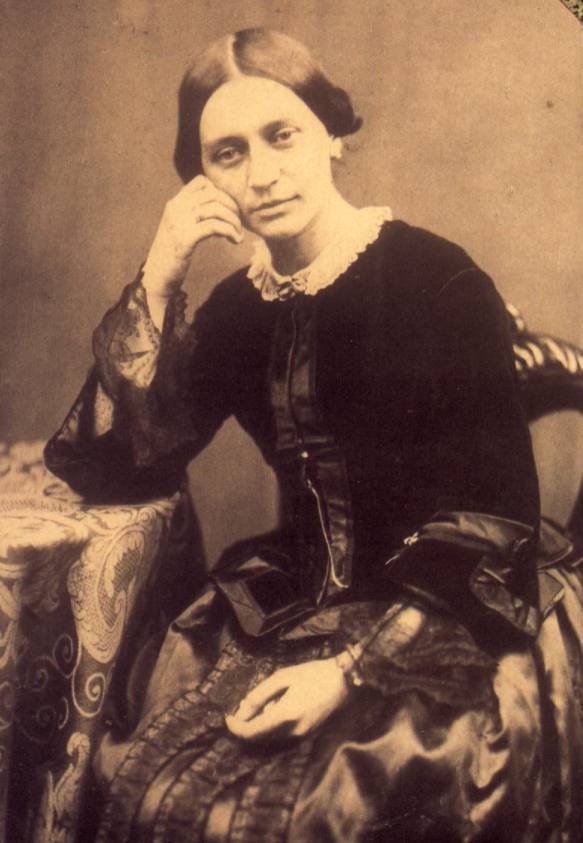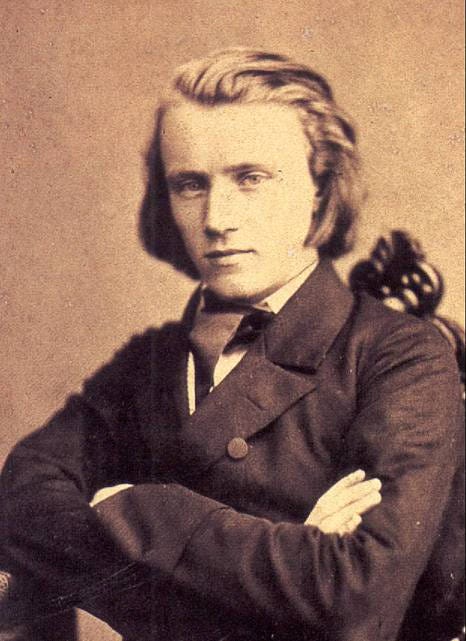The Sorrows of Young Johannes
On "Clara's theme" and classical music's most poignant love triangle

Many years ago on this day—February 27—a 44-year-old husband and father of six children jumped into the Rhine River in an attempt to take his own life. His suicide was unsuccessful, but rather than be brought home, the man requested to be taken to an asylum where he would spend the remaining two years of his life.
The year was 1854, and the man’s name was Robert Schumann, one of the most famous composers of his time. He is considered one of the greatest composers of the Romantic era, and his wife, Clara Schumann, is known as one of history's greatest piano virtuosas.
When her husband tried to kill himself, Clara was pregnant with her seventh child. By the time of Robert’s death in the asylum, Clara would have eight children by him.1 At 37 she found herself widowed and the sole breadwinner of her family.
However, she was not exactly alone. It just so happened that five months earlier, the Schumanns had started mentoring a 20-year-old musician and composer. His name was Johannes Brahms.
Brahms, who in a short amount of time had quickly become a good friend, immediately started helping Clara straighten her business and family affairs in his mentor’s absence. It was not long before Clara and Johannes developed strong feelings for each other— despite their 14-year age difference.
Brahms wrote to a friend,
I believe that I do not have more concern for and admiration for her than I love her and find love in her. I often have to restrain myself forcibly from just quietly putting my arms around her and even—: I don’t know, it seems to me so natural that she could not misunderstand.
And Clara wrote in her diary,
There is the most complete accord between us… It is not his youth that attracts me: not, perhaps, my flattered vanity. No, it is the fresh mind, the gloriously gifted nature, the noble heart, that I love in him.
However, the relationship would never go beyond a friendship, even after Robert’s death.
Not long ago I had the pleasure of hearing a local performance of Brahms’ C minor Piano Quartet No. 3, Op. 60. The program description makes not of the Brahms-Schumann connection:
This work, often noted as “painfully autobiographical” had roots that went back 20 years from its completion in 1875. Brahms began writing this intense and especially obsessive piece at a seriously troubling time in his life. In his writings, he alluded to suicidal thoughts, and wrestling with his secret love of composer, mentor and pianist, Clara Schumann.
You see, the interesting thing is that Clara’s husband, Robert Schumann, would incorporate a series of notes in his compositions to honor of his wife. This was known as “Clara’s theme.” Later Brahms would use similar melodic forms throughout many of his own compositions. (I found a podcast that offers a wonderful deep dive into many of the occurrences of Clara’s theme in both Schumann’s and Brahms’ work.) The piano quartet I attended has Clara’s theme as a sighing motif. See if you can listen for it in this recording by the Hochrhein Musikfestival.
The Piano Quartet No. 3 in C minor, Op. 60, was completed in 1875 and features the piano, violin, viola and cello. It is sometimes called the Werther Quartet after The Sorrows of Young Werther, a 1774 epistolary novel by Johann Wolfgang Goethe about a young man who suffers from the unrequited love of a married woman.2 (Ahem…)
In “Brahms and his Clara Themes” Eric Sams wrote,3
Brahms said of op. 60, point-blank, “imagine a man about to shoot himself” and also “picture a man in blue and yellow”. That colourful allusion may now seem cryptic. But taken literately its meaning would then be plain. Goethe's Werther, the archetypal Romantic hero, wore blue and yellow, and shot himself for love of a married woman, whose husband he honoured and admired. So op.60 will presumably express Brahms's hopeless love for Clara Schumann, before her widowhood.
This quartet was first performed twenty years after the heartbreak that inspired it. Even though Johannes and Clara would never marry each other, they maintained an intensely close platonic friendship, and they would continue to help each other. Clara would often be the first to perform Johannes’ compositions in public. In their later years, Brahms would send intermezzi infused with “Clara’s theme” to his friend, for her to play. Of these she would write, “In these pieces I at last feel musical life stir once again in my soul.”
Clara Schumann would die on May 20, 1896 at the age of 76. Johannes Brahms would die less than a year later on April 3, 1897 at the age of 63.
Clara would never remarry after Robert’s death.
Johannes would never marry at all.
I believe that I do not have more concern for and admiration for her than I love her and find love in her. I often have to restrain myself forcibly from just quietly putting my arms around her and even—: I don’t know, it seems to me so natural that she could not misunderstand. - Johannes Brahms
Long after the performance I attended in October, I have not been able to forget Clara’s theme or the story of Robert, Clara and Johannes. The gift of an artist is to help his or her audience remember the things that they love: the things worth living for and dying for. Whether it be poetry, painting, or musical compositions, art is able to pass from one generation to the next and to the next. It has been 128 years since Clara Schumann passed away in Frankfurt, Germany, and yet here I am in 2024, a Filipino-American mother of five sitting at her computer in Boston, Massachusetts writing about a widowed mother of eight young children, the men she loved, and the music they all made. This is the miracle of art. It is so easy for the names and the works of extraordinary people to be lost in the vast sea of history. Art makes it possible for the tide to bring them back to the shore of memory, like sea glass we can hold up to the light and call beautiful.
Finally, happy birthday,
! Sorry to begin with an unfortunately event at the top of the essay, but at least it yields an interesting story.Thank you for reading, and please consider becoming a paid subscriber! Some of my wonderful friends have had life circumstances change (which I completely understand) and they can no longer financially support me, but I really do need all the financial help I can get to support my education.
You can read about the Schumann children here. https://interlude.hk/robert-and-clara-schumann-children-what-happened-to-them/
https://en.m.wikipedia.org/wiki/Piano_Quartet_No._3_(Brahms)
“Brahms and his Clara Themes” The Musical Times 1971 © The Estate of Eric Sams. http://www.ericsams.org/index.php/interview-by-john-c-tibbetts







What a beautifully written essay about a fascinating trio from history. Love the title, pacing, musical insertions, and especially this reflection: "Art makes it possible for the tide to bring them back to the shore of memory, like sea glass we can hold up to the light and call beautiful."
I loved reading this. I never knew! What a story! And the title is brilliant!